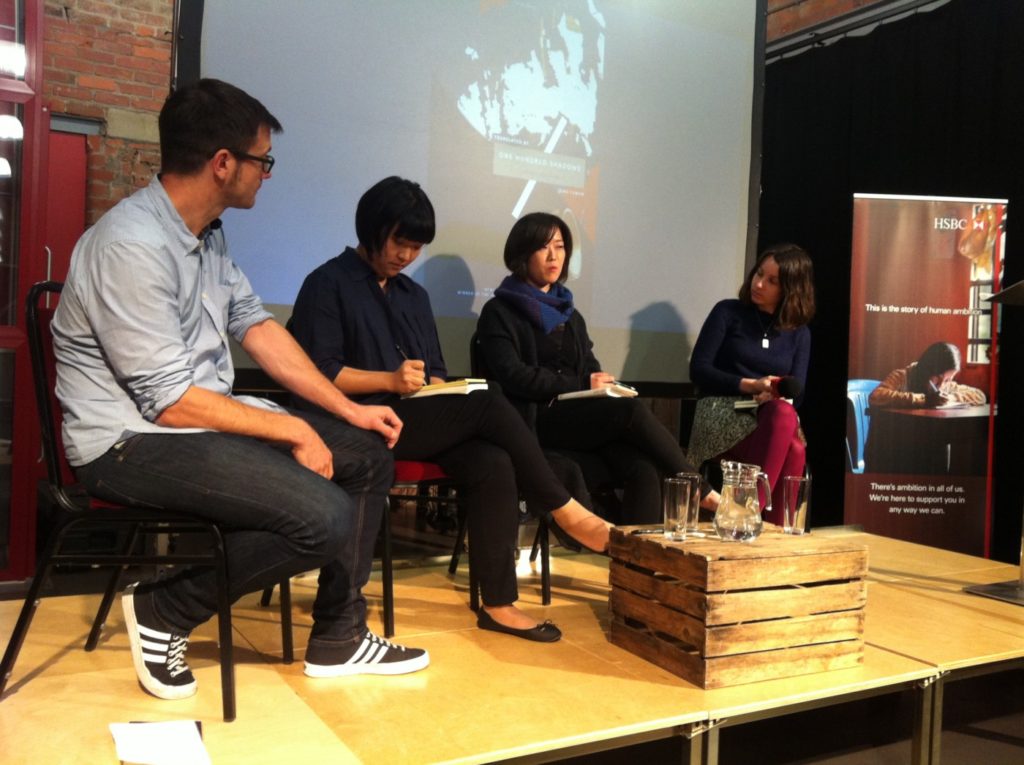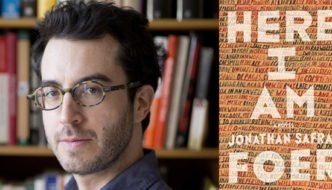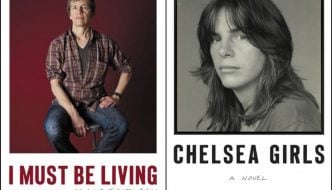Korean author Hwang Jungeun & Tilted Axis Press @ Manchester Literature Festival
November 17, 2016

As part of the international strand of this year’s Manchester Literature Festival, I went along to the Antony Burgess Foundation to see festival trustee Jerome de Groot chatting with Korean writer Hwang Jungeun and Deborah Smith, literary translator and founder of Hwang’s English-language publisher Tilted Axis Press.
Hwang’s novel One Hundred Shadows, published five years ago in Korean and recently picked up for translation by Tilted Axis, follows the intersecting lives of characters connected to a labyrinthine and dilapidated electronics market in Seoul. The characters are plagued by their shadows, which rise, omen-like, in various shapes and forms throughout the novel, lingering and beckoning for their human counterparts to follow them. A simplistic reading of the novel might be that it depicts isolation in the city, as characters find themselves left behind by rapidly evolving and increasingly homogenised urban environments. However, like all great literature, I would say the novel eludes such superficial qualifications. Hauntingly, humorously and at times heart-warmingly offbeat, the novel fulfils that Kafkaesque sense of a writer having touched on something profound – if only you could just get your head around what that something is.
Smith reads in English and Hwang in the original rhythmic, rolling Korean. The reading opens: “After the funeral my mother spent some time in the hospital, and when she came home she was carrying a shadow on her back. The shadow was quite large by then, and was so dark it defied description.” Hwang constructs a plane of reality which largely reflects the banality of the real world, and yet is slightly porous to something darker. Reminiscent of the likes of Murakami, she takes a far-fetched concept and runs with it as if it’s the most normal thing in the world, giving rise to an eeriness that is far more perturbing than outright horror stories. She manages to unsettle us in such a way in spite of, or perhaps because of, the sparseness of her prose: “Though the shadow repeated, I’m scared, I’m scared, its voice was empty of any fear”. The aesthetic of the read Korean aptly complements this feeling. Hwang’s timbre is chant-like, not soothing but questioning, seeming to intently probe the of evocative power of the surreal, to exhume dark sentiments lurking in our subconscious.
Hwang herself as enigmatic as her writing. De Groot asks her questions about her literary career, and Hwang tells us more about her medical history than her writing habits. “You need a lot of physical stamina”, Hwang says of her experience of writing a novel, describing it as “endurance training” for the stomach and spine. Its hard to tell if she’s truly rooted so fundamentally to all that is bodily, or whether she is teasing us, stubborn in her refusal to let us too far in, perhaps consciously constructing her artist’s persona to suit her writing style.
She lets slip enough for us to build up a picture of the story behind the novel. After witnessing a tragedy which occurred as a result of state violence in Seoul in 2005, Hwang found that writing factual essays and giving testimony about what she had seen in fact stripped a troubling experience of a vital element. Only by creating a fictional text which relied on an underlying, pervasive sense of the surreal could she begin to purge and communicate the real horror she had witnessed. As such, her novel, though thematically quite distinct from the original tragedy, was her way of expressing what was otherwise inexpressible.
Having literary translator Smith present, as well as an author of translated works, gave rise to thought-provoking conversation regarding the art of translation, prompted by questions from both De Groot and the audience. “I must say, I’m not 100% sure this is my book. Unfortunately.” Hwang admits, describing the experience of having your work translated as a “strange” process. A member of the audience follows up on this thought, asking Smith: As a translator, and necessarily an active reader, how do you mitigate against putting too much of your own reading into the story? Smith is well-equipped to answer this question and gives a thoughtful response. “You cannot not interpret” she explains, “Translation [has to be] a creative act in its own right.” At the same time, she weighs up, you can be aware of your own leanings as well as trying to refrain from overexplaining what is intentionally left implicit or ambiguous. “There is a certain elegance and beauty that comes from [literary devices] such as repetition and ambiguity,” she reflects, “Tropes may be allegoric, but it is also important that they retain a life of their own.”
With Hwang’s alluring persona and writing, the literary expertise of Smith and De Groot, and a flawless interpreter to ensure the event’s smooth delivery in both English and Korean, I felt the evening had a little bit of everything you would hope for from a literature festival event. I left feeling inspired, with a copy of One Hundred Shadows under my arm.
Filed under: Written & Spoken Word
Tagged with: event review, female author, female writer, Fiction, Hwang Jungeun, Korean author, Korean literature, Manchester Literature Festival, McrLitFest, MLF16, not-for-profit press, not-for-profit publishing house, One Hundred Shadows, South Korea, surrealism, Tilted Axis Press



Comments